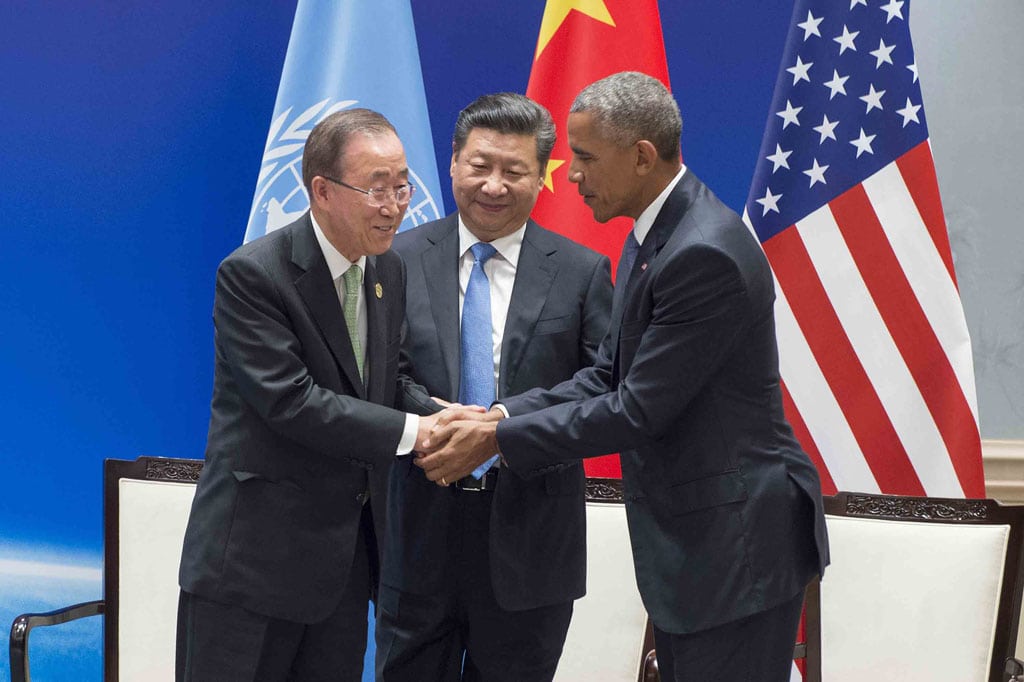
The United States and China, the world’s top two greenhouse gas emitters, on Saturday formally joined the Paris Agreement on climate change, bringing the deal one giant leap closer to entry into force. “The Presidents further express their continued commitment to work together and with others to promote the full implementation of the Paris Agreement,” a White House fact sheet says.
U.N. Secretary General Ban Ki-moon traveled to Hangzhou, China to receive the nations’ legal instruments for formally joining the agreement. “Now, by formally joining the Paris Agreement, you have added powerful momentum to the drive for the Agreement to enter into force this year,” Ban said in a ceremony, according to a U.N. release.
The Paris Agreement will enter into force 30 days after 55 nations representing at least 55 percent of global greenhouse gas emissions have submitted to the United Nations their instruments of ratification, acceptance, approval, or accession. Before Saturday’s announcement 24 nations representing only 1.08 percent of global GHG emissions had formally joined the accord.
Based on emissions data the nations submitted to the U.N. during the drafting of the Paris Agreement, the U.S. and China collectively account for nearly 38 percent of global GHG emissions – the U.S. is responsible for 17.89 percent, while China, the world’s largest emitter, produces 20.09 percent.
With Saturday’s announcement 26 nations representing 39.06 percent of global GHG emissions have formally joined the agreement. “Now, just as I believe the Paris Agreement will ultimately prove to be a turning point for our planet, I believe that history will judge today’s efforts as pivotal,” President Barack Obama, in China for the two-day Group of 20 Summit, said in prepared remarked released by the White House.
The Paris Agreement, which was adopted by nearly 200 nations in December at the 21st session of the Conference of the Parties to the United Nations Framework Convention on Climate Change, puts in place a legal framework under which nations will pursue nationally determined climate action goals. The stated goal of the agreement is to keep global temperature rise “well below” 2-degrees Celsius, with an ambition to limit it to 1.5-degrees
The agreement opened for signature on April 22 and was immediately signed by 175 nations, breaking U.N. records. At the signing ceremony at U.N. headquarters in New York, China announced its commitment to joining the agreement before the G20 Summit. The nation met that commitment Saturday, just one day ahead of the gathering.
UNFCCC Executive Secretary Patricia Espinosa immediately praised the U.S.-Chinese announcement. “I would like today to thank China and the United States for ratifying this landmark agreement—an agreement on which rests the opportunity for a sustainable future for every nation and every person,” Espinosa said in a UNFCCC release. “The earlier that Paris is ratified and implemented in full, the more secure that future will become.”
Initially, the agreement was written to enter into force in 2020. The negotiation process resulted in the 55/55 system that looks increasingly likely to result in the agreement entering into force in 2016.
Several other nations have pledged to join the agreement by the end of the year. According to Climate Analytics, they are: Albania, Antigua and Barbuda, Argentina, Australia, Bangladesh, Brazil, Canada, Chile, Comoros, Costa Rica, Ghana, Honduras, Indonesia, Iran, Jamaica, Japan, Kazakhstan, Liberia, Mali, Mexico, Micronesia, Monaco, Morocco, New Zealand, Nigeria, Papua New Guinea, Paraguay, Philippines, Sierra Leone, Ukraine, Vanuatu, and Vietnam.
If all of those nations make good on their commitments, 58 countries accounting for 59.88 percent of emissions will join the agreement by the end of the year. Of course, because of the 30 day lag time, the agreement might not enter into force until early 2017.
The U.N. will also host a special event on Sept. 21 in New York to give nations an opportunity to formally join the agreement. “The UN Secretary General’s special event in New York on 21 September offers a further, focused opportunity for others to join this wave of ambition and optimism towards a better and sustainable world,” Espinosa said.
Not everybody was thrilled with Saturday’s announcement. Sen. Jim Inhofe (R-Okla.), a vocal opponent of the agreement, made his feelings known even before the declaration, releasing a statement Thursday. “This latest announcement is the president attempting to once again give the international community the appearance that he can go around Congress in order to achieve his unpopular and widely rejected climate agenda for his legacy. The Senate does not support the Paris Agreement, which is why his administration prefers to not call it a treaty,” Inhofe said.
Republicans in Congress have long decried the administration’s claims that the agreement is not subject to ratification. The agreement by design does not include any legally binding targets or timetables; if it did, the administration would have had to bring it before the GOP-led Congress, where it would have been quickly rejected.